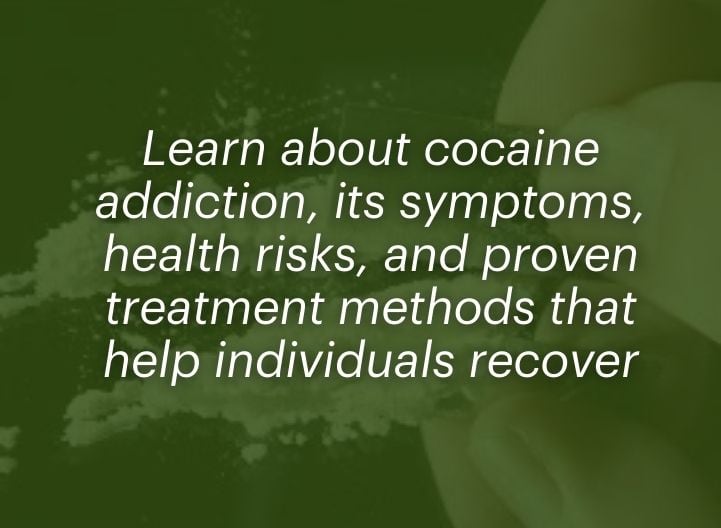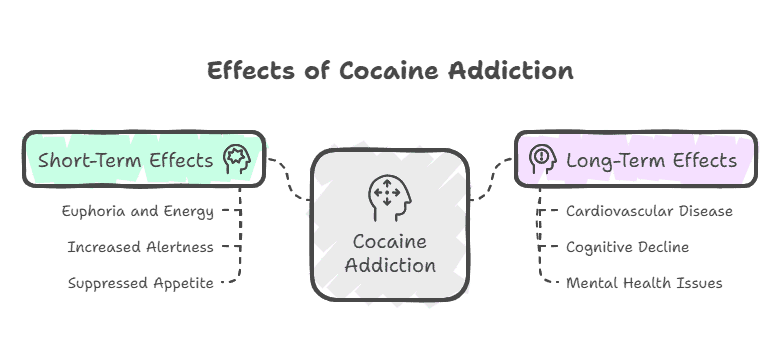Cocaine addiction is a powerful and destructive condition attributed to uncontrollable drug use despite harmful consequences. The latest authoritative data from the 2018 Comprehensive National Survey by the Ministry of Social Justice & Empowerment estimates about 1.14 million cocaine users in India, including 200,000 aged 10-17 and 940,000 aged 18-75, with a prevalence of around 0.06% among adolescents and 0.06% to 0.10% among adults, depending on the state.
The main causes of cocaine addiction include genetic predisposition, exposure to stressful environments, peer influences, and pre-existing mental health disorders.
Symptoms of addiction manifest physically through weight loss and nasal damage, behaviorally through secrecy and financial strain, and emotionally through irritability, depression, and cravings.
The effects of cocaine addiction are severe, ranging from short-term impacts such as intense euphoria, rapid heartbeat, and restlessness to long-term outcomes like insomnia, cardiovascular problems, and cognitive decline.
Effective treatment comprises detoxification, behavioural therapies, inpatient or outpatient care, and medications under medical supervision.
Recovery strategies focus on ongoing counselling, relapse prevention, peer support groups, mindfulness, and lifestyle changes. Overcoming cocaine addiction requires integrated de-addiction approaches that address the biological, psychological, and social components of the disorder.

What Is Cocaine Addiction?
Cocaine addiction is a chronic brain disorder involving the compulsive use of cocaine, a powerful stimulant that interferes with the brain’s reward system. Chemically, cocaine blocks the reuptake of dopamine, resulting in unusually high concentrations of this neurotransmitter in the brain’s synapses.
Physically, this produces surges of energy and euphoria, but repeated exposure encourages tolerance, dependence, and serious health deterioration. Psychologically, cocaine addiction drives intense cravings, impaired judgment, and compulsive behaviours.
Authoritative global data from the 2025 UN World Drug Report and related sources indicate that approximately 25 million people worldwide used cocaine in 2023, making it one of the fastest-growing illicit drug markets worldwide.
How Do People Use Cocaine?
People use cocaine through snorting, smoking, injecting, or orally consuming the drug. Snorting cocaine is the most common method and involves absorption through nasal tissues, leading to damage to the septum. Smoking crack cocaine delivers an immediate but short-lived high due to rapid absorption in the lungs. Injecting cocaine directly into the bloodstream intensifies its effects but greatly increases the risk of overdose and infections. Oral consumption is less common but still results in harmful cardiovascular effects. Each method influences the drug’s potency, duration, and risk of complications.
Why Is Cocaine So Addictive?
Cocaine is so addictive because it directly affects the brain’s reward system by intensifying dopamine levels. Normally, dopamine is released in response to pleasurable activities, but cocaine precludes its reuptake, precipitating intense and prolonged stimulation of opioid receptors. This artificial flood of dopamine elicits powerful reinforcement, driving users to repeat the behaviour. As time passes, tolerance develops, meaning larger doses are needed for the same effect, and dependence sets in, where withdrawal symptoms take place if the drug is not taken. This chemical hijacking of the brain underlies cocaine’s highly addictive nature.
What Are the Causes of Cocaine Addiction?
The causes of cocaine addiction are genetic predisposition, psychological factors, environmental influences, social pressures, and access to the drug. These factors interact, expanding vulnerability to dependence.
Common causes of cocaine addiction are given below:
- Biological predisposition: Genetic variations and brain chemistry differences increase risk. The research article “Molecular Genetics of Cocaine Use Disorders in Humans” by Fernàndez-Castillo et al. 2021 found that cocaine dependence is highly heritable, with twin studies showing rates of 65-79%. It also notes that about 16-20% of users develop addiction, linking genetic risk and environmental factors in its development.
- Environmental stressors: Living in high-stress or unstable environments aggravates drug use.
- Psychological factors: Anxiety, depression, and unresolved trauma augment susceptibility.
- Social influences: Peer pressure and cultural exposure to drug use encourage experimentation.
- Accessibility of cocaine: Availability and affordability increase the likelihood of misuse
What Are the Symptoms of Cocaine Addiction?
The symptoms of cocaine addiction are physical, behavioural, and emotional signs that provoke harmful and compulsive drug use. Physically, users experience weight changes and cardiovascular stress; behaviorally, they show secrecy and risky activities; emotionally, they display irritability, anxiety, and depression.
Physical Symptoms of Cocaine Addiction
The physical symptoms of cocaine addiction are listed below:
- Frequent nosebleeds from snorting
- Weight loss and compromised appetite
- Increased heart rate and blood pressure
- Dilated pupils
- Insomnia and restlessness
Behavioural Symptoms of Cocaine Addiction
The behavioural symptoms of cocaine addiction are given below:
- Secretive or deceptive actions to hide drug use
- Neglecting responsibilities at work, school, or home
- Risk-taking behaviours such as unsafe sex or reckless driving
- Financial problems due to spending on drugs
- Social withdrawal and isolation
Emotional Symptoms of Cocaine Addiction
The emotional symptoms of cocaine addiction are given below:
- Irritability and mood swings
- Intense cravings
- Acute anxiety or paranoia
- Depression after drug effects wear off
- Agitation or aggressive outbursts
What Are the Withdrawal Symptoms of Cocaine Addiction?
The withdrawal symptoms of cocaine addiction are fatigue, depression, irritability, increased appetite, and disturbed sleep. Unlike opioids, cocaine withdrawal is not usually physically dangerous, but it is psychologically intense and evokes relapse.
Common withdrawal symptoms of cocaine addiction are given below:
- Extreme fatigue and lack of energy
- Intense cravings for cocaine
- Depression and feelings of hopelessness
- Anxiety and restlessness
- Nascent appetite and weight gain
- Vivid unpleasant dreams
- Irritability and mood swings
What Are the Effects of Cocaine Addiction?
The effects of cocaine addiction are short-term stimulation, long-term physical decline, and serious psychological harm. In the short term, cocaine produces euphoria, alertness, and suppressed appetite, while long-term use damages cardiovascular health, disrupts sleep, and contributes to psychiatric disorders.

Short-Term Effects of Cocaine Addiction
The short-term effects of cocaine addiction are given below:
- Intense euphoria and energy
- Increased alertness and talkativeness
- Dilated pupils
- Suppressed appetite
- Rapid heartbeat
- High blood pressure
- Restlessness or irritability
Long-Term Effects of Cocaine Addiction
The long-term effects of cocaine addiction are given below:
- Chronic insomnia
- Significant weight loss and malnutrition
- Cardiovascular disease, such as a heart attack and stroke
- Cognitive decline and memory loss
- Persistent anxiety and paranoia
- Depression and suicidal thoughts
- Nasal damage or respiratory issues from prolonged use
What are the Treatments for Cocaine Addiction?
The main treatments for cocaine addiction are detoxification, behavioural therapies, inpatient care, outpatient programs, and supportive medications. These de-addiction interventions aim to stabilitate individuals, manage cravings, and build long-term coping strategies.
The treatment for cocaine addiction is given below:
Detoxification
A supervised process to clear cocaine from the system and manage withdrawal.
Behavioural therapies
Behavioural therapies, such as Cognitive Behavioural Therapy (CBT) and contingency management, address triggers and reinforce positive choices. Cognitive Behavioural Therapy (CBT) shows an effectiveness rate of 50-75%, substantially lowering substance use and supporting long-term recovery. This makes it a cornerstone of addiction treatment programs, as highlighted by Pybis, Jo, et al. 2017 in “The Comparative Effectiveness and Efficiency of Cognitive Behaviour Therapy and Generic Counselling in the Treatment of Depression: Evidence from the 2nd UK National Audit of Psychological Therapies.”F
Inpatient treatment
Residential care offering 24/7 medical and psychological support.
Outpatient treatment
Flexible treatment for individuals balancing daily responsibilities with recovery.
Medications (supportive care)
While no approved medication exists, drugs targeting dopamine regulation are under study to reduce cravings. Globally, several medications such as baclofen, topiramate, disulfiram, and modafinil have shown promise in clinical trials for cocaine dependence. Still, none have gained widespread official approval as a cocaine addiction cure.
A cocaine vaccine (TA-CD) is still in experimental stages. India follows a National Action Plan for Drug Demand Reduction, focusing mainly on prevention, counselling, and rehabilitation centres rather than approved pharmacological treatments for cocaine addiction.
What Are the Recovery Strategies from Cocaine Addiction?
The strategies for recovering from cocaine addiction are counselling, therapy, relapse prevention, peer support, lifestyle changes, and stress management. These de-addiction strategies promote long-term sobriety by addressing both the psychological and social challenges of recovery.
The strategies for recovering from cocaine addiction are given below:
- Continued therapy: Regular sessions with a professional to manage cravings and underlying issues.
- Counselling: Individual or group counselling inspires coping skills and emotional resilience.
- Relapse prevention: Identifying personal triggers and creating tailored prevention plans.
- Support groups: Programs like Cocaine Anonymous provide community accountability.
- Healthy lifestyle: Balanced diet, regular exercise, and proper sleep aid recovery.
- Mindfulness practices: Meditation and yoga help regulate emotions and minimise stress.
- Stress management techniques: Breathing exercises and relaxation methods lower relapse risk.
Can You Overdose on Cocaine?
Yes, you can overdose on cocaine. A cocaine overdose happens when toxic levels of the drug overwhelm the body, leading to severe health risks such as dangerously high blood pressure, irregular heartbeat, seizures, stroke, or heart attack. In some cases, overdose is fatal, especially when mixed with alcohol, opioids, or other substances. Prompt medical attention is critical, as rapid treatment means the difference between life and death.





